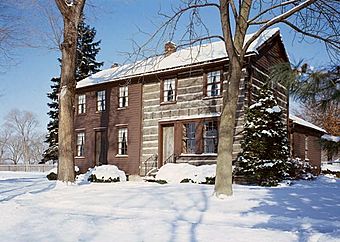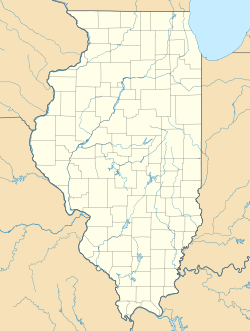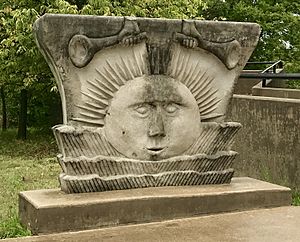Nauvoo Historic District facts for kids
|
Nauvoo Historic District
|
|

Joseph Smith Homestead
|
|
| Location | Nauvoo, Illinois |
|---|---|
| Area | 3,850 acres (1,560 ha) |
| Built | 1839 |
| NRHP reference No. | 66000321 |
Quick facts for kids Significant dates |
|
| Added to NRHP | October 15, 1966 |
| Designated NHLD | January 20, 1961 |
The Nauvoo Historic District is a special area in the city of Nauvoo, Illinois. It's like a big outdoor museum that helps us understand the past. This district is almost the same size as the city of Nauvoo was when it was first officially formed in 1840.
It also includes the Pioneer Saints Cemetery. This is the oldest cemetery for the early members of the Latter Day Saint movement in the area. Even though it's just outside the city limits, it's an important part of the historic district.
Contents
What is Nauvoo Historic District?
The Nauvoo Historic District was named a National Historic Landmark in 1961. This means it's a very important place in American history. It was the main home for The Church of Jesus Christ of Latter-day Saints from 1839 to 1846.
The district is also important because it shows how early communities were planned. Even today, you can still see the original layout of the city. Many old sites are still there, including where the original Nauvoo Temple once stood.
Important Buildings and Places
Many old buildings and sites are part of the Nauvoo Historic District. These are called "contributing structures" because they help tell the story of the past. Some of these include:
- Brigham Young Home
- Calvin Pendleton Home and School
- David Sessions Home
- Edward Hunter Home
- Heber C. Kimball House
- John Taylor Home, Printshop, and Post Office
- Jonathan Browning Houses and Workshops
- Joseph Smith Homestead
- Joseph Smith Mansion House
- Lucy Mack Smith Home
- Lyon Drug Store
- Nauvoo House
- Nauvoo Illinois Temple
- Nauvoo Visitors Center
- Newel K. Whitney Home
- Orson Hyde Home
- Red Brick Store
- Riser Boot and Shoe Shop
- Sarah Granger Kimball Home
- Scovil Bakery
- Seventies Hall
- Smith Family Cemetery
- Stoddard Tin Shop
- Webb Blacksmith Shop
- West Grove
- Wilford Woodruff House
- Willard Richards Home
- William Gheen Home
- William Weeks Home
- Yearsley House
There are also some newer buildings in the district that are not part of the original historic collection.
A City with a Special History
Nauvoo grew very quickly in the 1840s. For a short time, it was the largest city in Illinois! Even with so many people, the city didn't have a big central shopping area. It was mostly homes built on wide, straight streets.
The original Nauvoo Temple was a very important building. It was burned in 1848 and later destroyed by a tornado in 1865. Today, a new temple stands in its place.
Later Changes and Restoration
Most members of The Church of Jesus Christ of Latter-day Saints left Nauvoo by 1848. However, some people, like Emma Smith and Lucy Mack Smith, stayed.
Later, in the mid-1950s, members of The Church of Jesus Christ of Latter-day Saints began to buy and fix up many of the old properties. They wanted to share the history of Nauvoo from the 1840s. In 2024, The Church of Jesus Christ of Latter-day Saints bought the Joseph Smith Historic Site. The Smith Family Cemetery is still owned by the Community of Christ church.
See also
 | William L. Dawson |
 | W. E. B. Du Bois |
 | Harry Belafonte |




